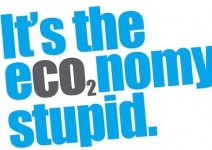Image: net_efektOne of the silliest headlines to come out of the debt ceiling postmortems comes from ClimateWire (sub req):
Debt deal, promising energy budget cuts, appear to chill hopes for a carbon tax
How exactly do you chill something that has been frozen near absolute zero?
In fact, in my reading, the debt deal actually warmed up hopes for a carbon tax from those liquid helium temperatures to at least liquid nitrogen temperatures — you know, around -321 degrees F.
Why? Because it didn’t include any revenue increases or reforms in the tax code. That means a grand bargain is still on the table. There are two things Republicans want more than anything else in the bargain, more even than actual debt reduction: extension of the Bush tax cuts for the wealthy, and a reduction in the corporate tax rate.
And there is one thing Democrats will insist on as part of the post-2012 debt ceiling deal: some net revenue increases.
Yes, it’s true that President Obama has proven himself to be a feckless negotiator and even worse messager on the debt issue. But he will actually have maximal leverage right after the 2012 election, when the Bush tax cuts are poised to expire if no positive action is taken. Also, he won’t be up for reelection, so, in theory, he can play hardball. Yes, I know, it’s a theory, but remember, we’re 321 degrees F below zero. Put on your thermal underwear and play along.
Obama could trade both the Bush tax cuts and the corporate tax rate reduction for a carbon tax. No, I’m not saying he will. I’m only saying that he could — and indeed, it strikes me as his only opportunity in his entire second term to enact any policy that would actually reduce absolute levels of U.S. greenhouse-gas emissions.
It is therefore his only chance to meet the commitment he made before Copenhagen, a commitment that is certainly crucial if there is to be a global deal during his hypothetical second term, a commitment that is crucial if there is to be even a tiny chance of averting multiple, catastrophic climate impacts. Yes, Obama does have to get reelected for this scenario to make much sense, but that looks to be at least 50-50 right now.
The ClimateWire piece comes to its conclusions with some bizarre quotes from experts at the end:
“A carbon tax could be an appealing alternative to even more ambitious cuts to entitlements and defense spending as well as a national value-added tax, repealing the home mortgage tax deduction, or higher income taxes,” [economist Joe] Aldy said in an email. “A well-designed carbon tax could raise some revenues to finance deficit reduction and enable a reduction in payroll tax rates, for example.”
No, that isn’t the bizarre quote. That’s kind of sane.
Still, a former Democratic aide who is promoting climate policies believes the debt deal formalizes the discussion around new revenue. In a “rational” world, that debate would naturally lead to the benefits of taxing pollution over paychecks, this person said.
“I personally think the likelihood of a big tax deal has increased,” the former aide said, noting that carbon revenue could be combined with lower tax rates for people and corporations.
Hmm. Not bizarre either. Seems to contradict the headline, actually …
But others express astonishment at the thought of a carbon tax being passed by a House that just forced the White House to abandon smaller goals on revenue, like stripping subsidies from oil and gas companies.
“If it didn’t work this time, how’s it going work next time?” asked Ted Gayer, an economist with the Brookings Institution who supports a carbon tax. “I don’t want to be pessimistic, but I didn’t look at the [debt] compromise and see this as a big opening.”
I’m not sure what is meant by “it didn’t work this time,” because there was no carbon tax put on the table this time. In any case, Gayer’s point is that there is not a “big opening.” Who could argue with that? But that isn’t the same as it having chilled the possibility. No, for that we have Joshua Freed, vice president of clean energy at Third Way:
Freed, of Third Way, thought he misheard a reporter ask about a carbon tax — in his mind, it’s that farfetched.
“In which country and under which Congress?” he asked. “That’s as likely as me pitching for the Nats this year — impossible.”
So one quote saying it is impossible. And from a guy who just last month coauthored a paper titled “Climate Pragmatism” that said the only politically pragmatic climate strategy for the U.S. should be built around a big new federal spending effort of $15 billion a year or more for low-carbon technology. So more than $100 billion in new spending over 10 years is a pragmatic thing to propose, but a carbon tax, which actually raises revenues — well, that is impossible.
Certainly it ain’t likely. But the chances for a carbon tax are also certainly considerably higher than for the $15 billion a year or more clean energy spending effort.
In fact, if Obama actually made a veto threat over it and offered the deal I proposed above, he could almost certainly get some sort of carbon tax. Yes, I know, a very big “if” to make it happen, but that is what climate hawks are for, no?



